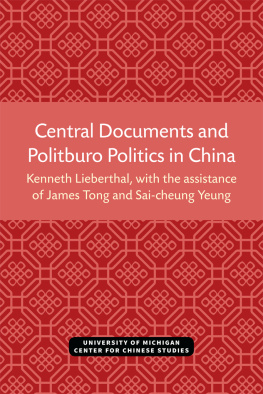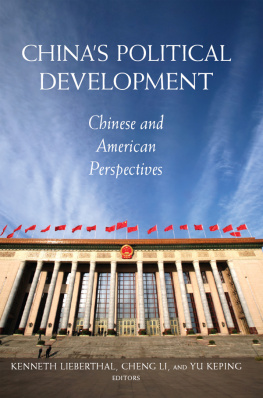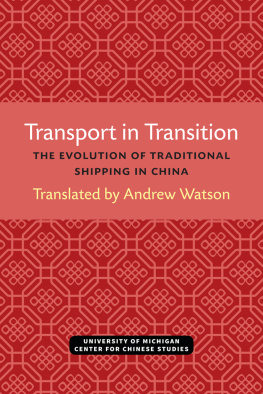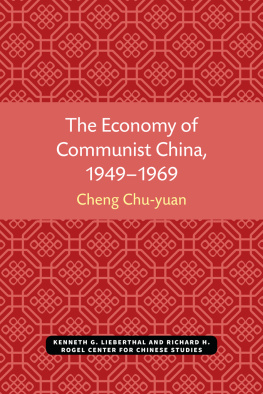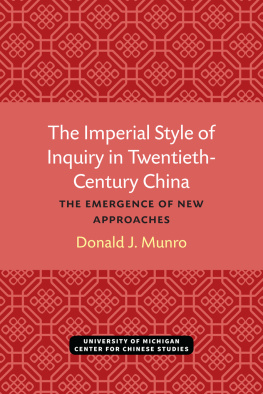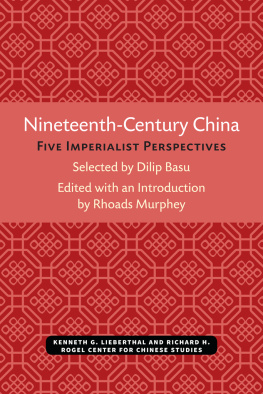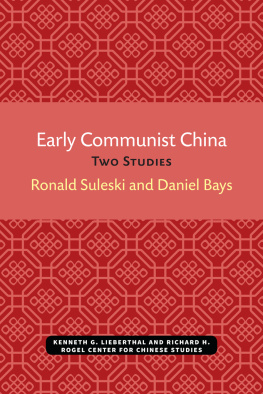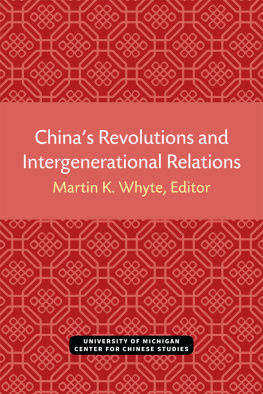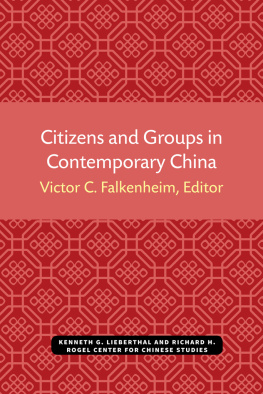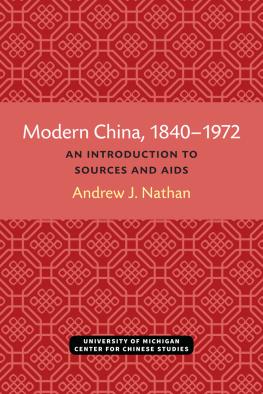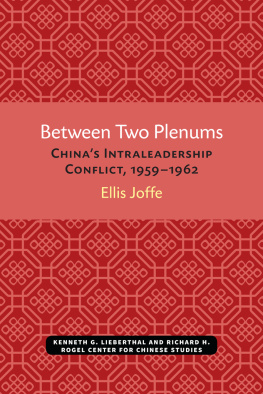Kenneth Lieberthal - Central Documents and Politburo Politics in China
Here you can read online Kenneth Lieberthal - Central Documents and Politburo Politics in China full text of the book (entire story) in english for free. Download pdf and epub, get meaning, cover and reviews about this ebook. year: 1978, publisher: Kenneth G. Lieberthal and Richard H. Rogel Center for Chinese Studies, genre: Romance novel. Description of the work, (preface) as well as reviews are available. Best literature library LitArk.com created for fans of good reading and offers a wide selection of genres:
Romance novel
Science fiction
Adventure
Detective
Science
History
Home and family
Prose
Art
Politics
Computer
Non-fiction
Religion
Business
Children
Humor
Choose a favorite category and find really read worthwhile books. Enjoy immersion in the world of imagination, feel the emotions of the characters or learn something new for yourself, make an fascinating discovery.
- Book:Central Documents and Politburo Politics in China
- Author:
- Publisher:Kenneth G. Lieberthal and Richard H. Rogel Center for Chinese Studies
- Genre:
- Year:1978
- Rating:3 / 5
- Favourites:Add to favourites
- Your mark:
- 60
- 1
- 2
- 3
- 4
- 5
Central Documents and Politburo Politics in China: summary, description and annotation
We offer to read an annotation, description, summary or preface (depends on what the author of the book "Central Documents and Politburo Politics in China" wrote himself). If you haven't found the necessary information about the book — write in the comments, we will try to find it.
Central Documents and Politburo Politics in China — read online for free the complete book (whole text) full work
Below is the text of the book, divided by pages. System saving the place of the last page read, allows you to conveniently read the book "Central Documents and Politburo Politics in China" online for free, without having to search again every time where you left off. Put a bookmark, and you can go to the page where you finished reading at any time.
Font size:
Interval:
Bookmark:

THE UNIVERSITY OF MICHIGAN CENTER FOR CHINESE STUDIES
MICHIGAN PAPERS IN CHINESE STUDIES
NO. 33
CENTRAL DOCUMENTS AND POLITBURO POLITICS IN CHINA
by
Kenneth Lieberthal
with the assistance of
James Tong and Sai-cheung Yeung
Ann Arbor
Center for Chinese Studies
The University of Michigan
1978
Open access edition funded by the National Endowment for the Humanities/Andrew W. Mellon Foundation Humanities Open Book Program.
Copyright 1978
by
Center for Chinese Studies
The University of Michigan
Library of Congress Cataloging in Publication Data
Lieberthal, Kenneth.
Central documents and Politburo politics in China.
(Michigan papers in Chinese studies; no. 33)
Includes bibliographical references.
1. China--Politics and government--1949-1976.
2. China--Politics and government--1976
3. Chung-kuo kung chan tang. Chung yang wei yen hui.
4. Chung-kuo kung chan tang. Chung yang cheng chih ch. 5. China--Government publications. I. Tong, James, 1947- joint author. II. Yeung, Sai-cheung, joint author. III. Title. IV. Series.
JQ1509 1978. L53 354.51 78-8740
ISBN 0-89264-033-2
Printed in the United States of America
ISBN 978-0-89264-033-1 (paper)
ISBN 978-0-472-12754-2 (ebook)
ISBN 978-0-472-90149-4 (open access)
The text of this book is licensed under a Creative Commons Attribution-NonCommercial-NoDerivatives 4.0 International License: https://creativecommons.org/licenses/by-nc-nd/4.0/
To my parents
Milton and Naomi Lieberthal
CONTENTS
I undertook the research for this study at the Center for Chinese Studies of the University of Michigan and benefited greatly from the excellent working facilities and staff support provided by the Center. James Tong and Sai-cheung Yeung made major contributions to this project, each in his own way having far more input than is usually conveyed by the rubric research assistant. I owe a deep debt of gratitude to each. Sophia Lee put together the information in Appendix II from my scattered files, typed the initial draft of the manuscript, made important editorial suggestions, and assisted in certain phases of the research. Her dedication and good judgment have thus played a significant role in bring this project to fruition. Marlene Thom worked with great speed and skill in improving the quality of the presentation and husbanding the manuscript through the editorial and publication processes.
I have also benefited from the comments of a number of my colleagues. Most of these were made in response to presentations of portions of this study in seminars at the University of Michigan, Harvard University, Columbia University, George Washington University, and the Department of State. Michel Oksenberg and Gregory Shaw read the entire manuscript and made important and useful suggestions.
The research for this study was supported by the Department of State under Contract No. 1722-620042. Views and conclusions contained in this study do not represent the official opinion or policy of the Department of State.
I am very grateful to M. E. Sharpe, Publisher, for permission to use the translation of the Outline Summary Report of the Work of the Academy of Sciences contained in Appendix I. This translation also appears in Chinese Law and Government , vol. XI.
Neither the organizations nor the individuals mentioned above are responsible for the views, interpretations and misinterpretations that appear on the following pages. All errors of fact and judgment are my own, but they would have been more numerous by far had it not been for those whose generous assistance is acknowledged here.
Virtually every analysis of Chinese politics views the Politburo as the nerve center of the system, but questions abound as to how this center governs itself and how it interacts with the system around it. Specifically, how much consultation occurs during the drafting of major Politburo documents, and who is brought into this process ? How is information channeled up to this body, and what are the rules that govern the access of the Politburo members themselves to data generated by the bureaucracies ? How are the political strategies of individual leaders and political factions attuned to this system of information channeling? What types of decisions are reached by the Politburo? To whom are they communicated ? How rigidly must they be followed ? How institutionalized is this entire decision making system, and has it become more--or less--institutionalized over the years ? How has the factional legacy of the Cultural Revolution affected its mode of operations ? Indeed, in the wake of the Cultural Revolution, how much in control of the system has the Politburo itself been?
Scholars to date have looked at the apex of the Chinese polity from a range of angles--by analyzing factional conflict among the leaders, This is the series of documents through which the top Party leadership directly communicates with the rest of the political system. While officially regarded as Central Committee documents, the overwhelming majority of these have in fact been adopted by a smaller group--the Politburo, its Standing Committee, or even by Mao Tse-tung alone in the name of the Central Committee. Some have been adopted at large meetings that bring together a considerable range of Party leaders, as detailed below, and a very few have actually issued from Central Committee plenums and been published in the media at the conclusion of these gatherings. This last group clearly differs from the larger class of Central Documents of which it is a part, however, and is therefore omitted from consideration in this study.
The political environment within which the Central Document system is nested is one marked by a constant tension between formal organizations and procedures, recognized as indispensable for governing a vast country, and informal means of deliberating and communicating, required to circumvent bureaucratic rigidities while maintaining strict secrecy. Although study of the Central Document system of necessity focuses more on the formal dimensions of the policy process at the highest levels, political strategies inevitably intrude and affect such fundamental choices as whether or not to use the Central Document system in the first place. The top Party leaders, after all, enjoy a wide variety of options for communicating information to lower levels.
Structurally, the Central Document series is only one of an impressive array of document streams that flow from Peking to the lower levels of the political hierarchy. Each major Central organ, for example, can issue its own documents, and almost certainly the Politburo can channel information into any of these other document series (such as that of the State Council or the Military Commission, as appropriate). Indeed, given the fact that most members of the Politburo simultaneously hold at least one major post in another leading organ, it is possible that key individuals might use their special access to these other document streams to convey information that they do not want funneled through the Politburo itself.
Changing relationships among Chinas major bureaucracies--the Party, PLA and government--also may have contoured the use of the CD network at different periods. In brief, the government apparatus under Chou En-lai maximized its role during the First Five Year Plan of 1953-57, the Party hierarchy under Liu Shao-chi largely ran the Great Leap Forward in 1958-62, and the PLA under Lin Piao picked up the pieces from the shambles of the Cultural Revolution in the late 1960s. In all likelihood, as Chou, Liu and Lin successively assumed the key roles under Mao in the system, they shunted an increasing range of issues into the document stream of their own bureaucracy. although too little information is available to draw firm conclusions on this issue.
Font size:
Interval:
Bookmark:
Similar books «Central Documents and Politburo Politics in China»
Look at similar books to Central Documents and Politburo Politics in China. We have selected literature similar in name and meaning in the hope of providing readers with more options to find new, interesting, not yet read works.
Discussion, reviews of the book Central Documents and Politburo Politics in China and just readers' own opinions. Leave your comments, write what you think about the work, its meaning or the main characters. Specify what exactly you liked and what you didn't like, and why you think so.

